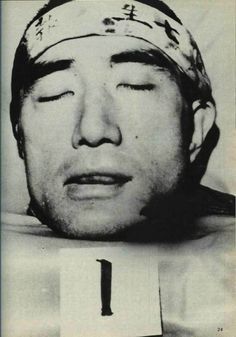... there is also a sense in which Mishima wants Japan ...
... there is also a sense in which Mishima wants Japan to be in decline so that he can be its last defiant hero, a kamikaze of Japanese beauty. I read his entire project - in which I include his literary genres, his essays and critical writings, his public lectures and media appearances, and his violent suicide - as a single, sustained decadent lyric that ironically flaunts its own contradictions and its futility. Mishima's work is suffused with a sense of ending - the end of art, the end of eroticism, the end of culture, the end of the world - and it conforms to a decadent aestheticism that holds that beautiful things radiate their most intense beauty on the cusp of their destruction.
... Mishima does not rush toward death. On the contrary, he takes his time. Assiduously and manipulatively he constructs a narrative that will enable him to give a logical cohesiveness to his character, to link himself to myth and to tradition, to turn his eroticism into an ethical obligation, and to make his death serve as the terrorist culmination of his desire to impose his conception of beauty on the world, whether the world likes it or not.
[...] Mishima's death is, in obvious ways, the culmination of his life's work and of all the aspects of his thinking that we have investigated in this book. His extreme aestheticism, his narcissism, his eroticism, his desire to transcend modernity and link to the spirit of Japan's classical literature, to turn himself into a sublime object, and his compulsion toward crime, toward evil, and toward the divine terror, all achieve their clearest expression and, we must assume, their personal fulfillment. Mishima's death also affects a permanent change on his literary works, every one of which now appears to point inevitably to this moment, as if every word he had written was posthumous. Through originality in the arrangement of his fate, Mishima has given his work a seemingly indestructible cohesion.
As for Morita's role, on the level of psychodrama it is best to think of him as alternative Hiraoka [Hiraoka was Mishima's original name - Lars]. A Hiraoka free of artistic sensibility, with no interest in literature at all. A strong and healthy and happy Hiraoka. A Hiraoka who passed the military inspection and joined the Imperial Army. A heterosexual Hiraoka. This Hiraoka becomes Mishima's executioner.
The question that is always asked about Mishima is: was he sincere or was he acting? This really equates to asking: Is it real or is it art? But in Mishima's case, as I have tried to show, this is a nonquestion. For Mishima, art is not the opposite of reality. Art for him is a different kind of reality. Mishima represents an apotheosis of the Nietzschean idea that life can be justified only as an aesthetic phenomenon. His act of aesthetic terrorism was not a failed coup d'��tat but a triumphant coup de th����tre, a spectacular piece of performance art that was simultaneously a radical anti-artistic gesture. Mishima believed that he had taken the idea of life as art to its extreme point, beyond which no one could go any further.
Jean Baudrillard says, 'The supreme consecration for a work: to be realised by the very event that destroys it'. Mishima has surely done more than this. The supreme consecration for an artist: to be destroyed by the very event that realises and completes his entire life's work.
An artist who actualises all his creative possibilities, good and bad, beautiful and ugly, and succeeds - through the pure realization of a will to power that will not yield to anything in this world - in condensing them into a single momentous even, the effect of which is so beautiful yet so shocking that those who contemplate it are left wondering whether it is a work of art or an act of madness, has surely achieved a masterpiece of some kind. It is, as Mishima intended it to be, a cruel and defiant masterpiece: a terror attack on the modern consciousness, a warning to the 'last humans', and a challenge to all those coming after Mishima who would dare to call themselves artists.
Transcription mostly from the final, brilliant pages of Andrew Rankin's Mishima: Aesthetic Terrorist
Lars Iyer's Blog
- Lars Iyer's profile
- 99 followers





